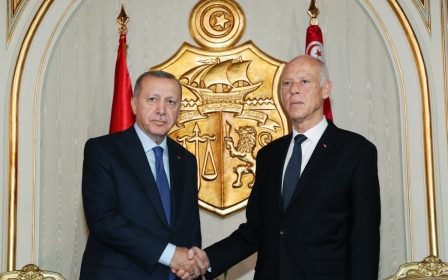Turkey: Influencer indicted for sharing images from Amsterdam's Sex Museum

A Turkish social media influencer has been summoned to appear in court for posting images from inside Amsterdam's Sex Museum, Dutch media reported.
Merve Taskin, 23, told Het Parool, an Amsterdam-based daily newspaper, that she was scheduled to appear in court in October to face obscenity charges.
Taskin told the newspaper that she travelled to the Netherlands last year to celebrate her 22nd birthday and visited the world-famous museum where she shared photos of some of the merchandise on sale, including penis-shaped pasta.
According to Taskin, who has over 500,000 Instagram followers, she was arrested twice following her return.
"I gave my statement to the police. I thought it was over but months later I was arrested again. I was held for one night and I gave prosecutors a statement about the posts. He said after I was free to go," she said.
New MEE newsletter: Jerusalem Dispatch
Sign up to get the latest insights and analysis on Israel-Palestine, alongside Turkey Unpacked and other MEE newsletters
Taskin added that she later received a text message summoning her to appear at an Istanbul court on 26 October to face obscenity charges.
According to the BBC, that report having seen a screenshot of the message, Taskin is charged with violating Article 226 of Turkey's penal code.
Under Turkish law, publishing “obscene material” results in a prison sentence of between six months to three years, as well as a judicial fine.
On her Instagram page, Taskin calls her controversial posts, "humorous", saying, "I don't know what the judge will decide but thank you for being with me."
Meanwhile, on an Instagram story, the influencer posted screenshots of direct messages she reportedly received from Monique Van Marlet, the director of Amsterdam's Sex Museum.
"It is unreal to us that this is happening," the director of the Museum is reported to have written.
"Our museum is intended to educate people all around the world about the history of sex. We admire you for expressing yourself and posting such pictures," the message read.
Turkey has been criticised for limiting freedom of expression in the past. Last year, censorship increased when the Turkish parliament passed a law granting the government broad powers over social media platforms.
This article is available in French on Middle East Eye French edition.
Middle East Eye delivers independent and unrivalled coverage and analysis of the Middle East, North Africa and beyond. To learn more about republishing this content and the associated fees, please fill out this form. More about MEE can be found here.





